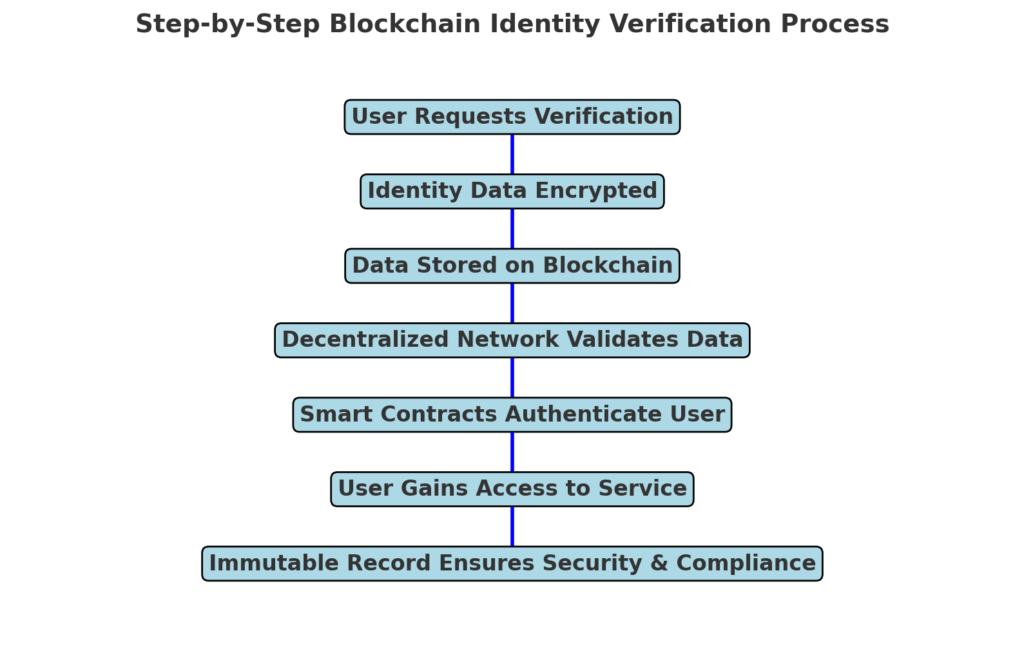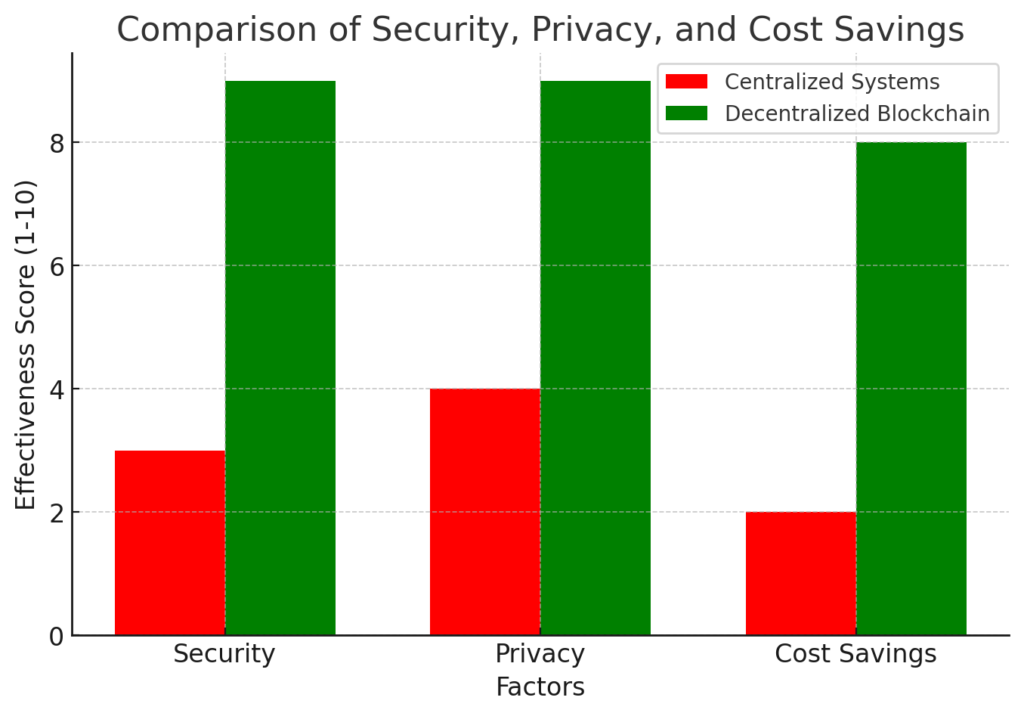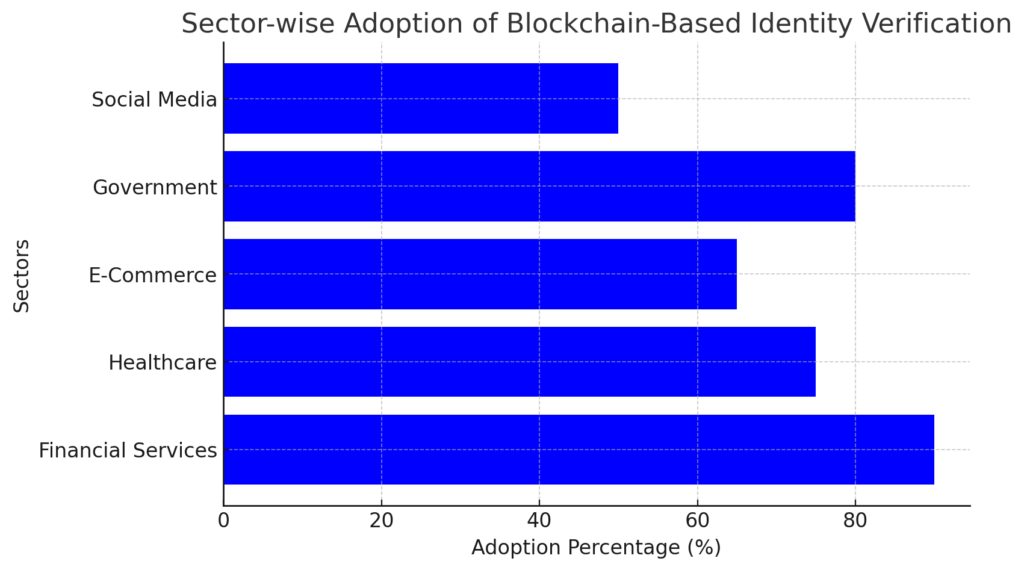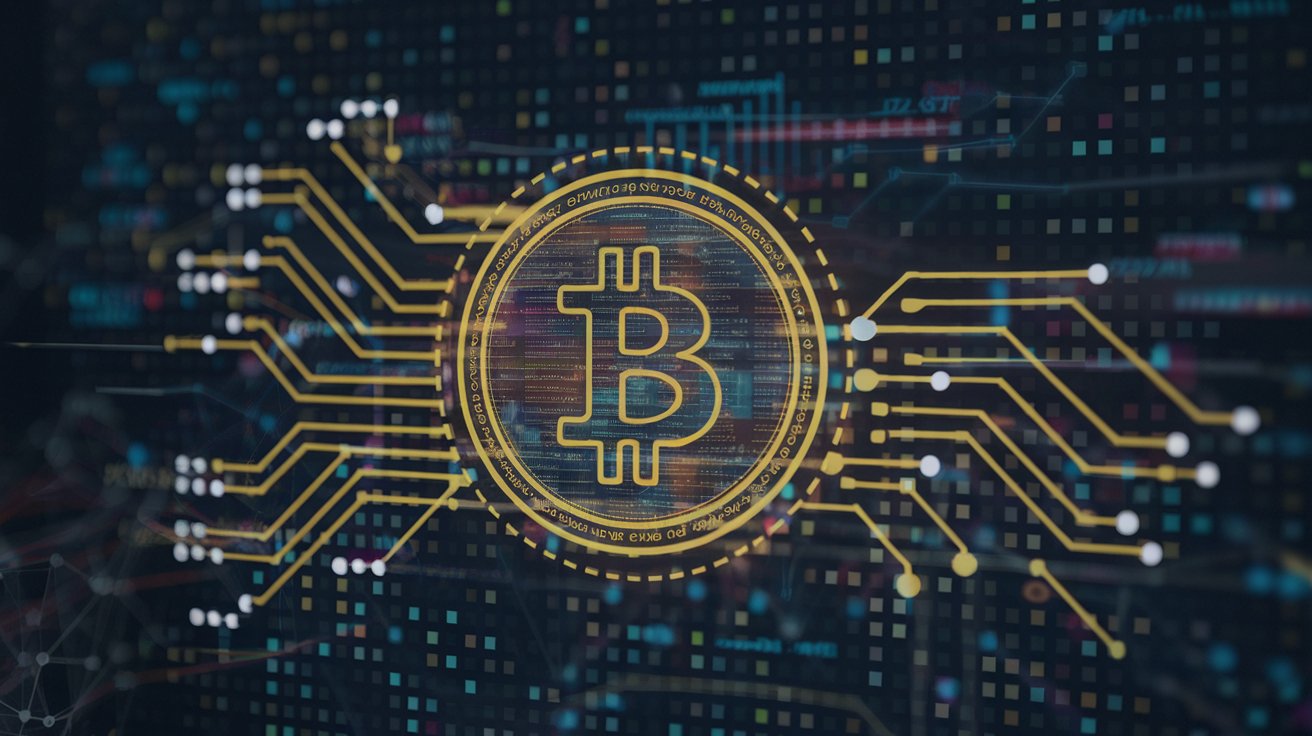Blockchain-based identity verification is revolutionizing online security, offering a safer and more efficient way to protect personal data. With cyber threats on the rise, traditional identity systems are proving to be vulnerable, putting sensitive user information at risk. Data breaches, identity theft, and fraudulent activities continue to plague online platforms, making it clear that existing verification methods are no longer sufficient.
Comparison: Centralized vs. Decentralized Identity Verification
| Feature | Centralized Identity Verification | Decentralized Identity Verification (Blockchain) | Which is Better? |
| Data Storage | Stored in a central database | Stored across multiple nodes (decentralized) | Decentralized |
| Security | Prone to hacking | Highly secure with encryption | Decentralized |
| User Control | Limited control | Full user control | Decentralized |
| Risk of Data Breach | High risk | Low risk | Decentralized |
| Verification Speed | Slow due to intermediaries | Fast due to smart contracts | Decentralized |
| Cost | Expensive due to middlemen | Lower costs due to automation | Decentralized |
| Regulatory Compliance | Difficult compliance with data privacy laws | Easier compliance with GDPR, KYC | Decentralized |
| Scalability | Can handle large user bases but with security risks | Scalability challenges but improving with Layer 2 solutions | Needs Improvement |
Blockchain technology presents a game-changing solution by decentralizing identity verification, enhancing security, and giving users greater control over their personal information. This article delves into how blockchain-based identity verification works, its key benefits, and why industries worldwide are rapidly adopting it. Read on to discover why this innovation is set to define the future of digital identity protection.
Understanding Blockchain-Based Identity Verification
Blockchain-based identity verification leverages distributed ledger technology to store and manage identity data securely. Unlike traditional systems that store user information in centralized databases, blockchain creates a decentralized, encrypted record that cannot be altered or hacked easily.

How Blockchain Identity Verification Works
| Key Component | Explanation |
|---|---|
| Decentralization | User data is stored across multiple nodes, eliminating single points of failure. |
| Encryption & Security | Identity data is encrypted and stored securely, ensuring maximum protection. |
| Smart Contracts | Automated agreements facilitate secure and instant identity authentication. |
| User Control | Individuals own and control their identity, reducing dependence on third parties. |
| Immutability | Once recorded, data cannot be altered, ensuring trust and transparency. |
Advantages of Blockchain-Based Identity Verification

Enhanced Security and Fraud Prevention
Blockchain’s decentralized nature eliminates the risk of massive data breaches that frequently occur in centralized systems. Since identity records are encrypted and stored across multiple nodes, they are nearly impossible to hack or manipulate. This significantly reduces identity theft and fraud.
Improved Privacy and User Control
With blockchain identity verification, individuals have full control over their personal data. They can grant or revoke access to specific information without exposing their entire identity, ensuring privacy and data security.
Faster and More Efficient Verification
Unlike traditional identity verification processes that can be slow and involve multiple third parties, blockchain simplifies authentication by using smart contracts. This enables instant verification, reducing waiting times and improving user experience.
Cost Savings for Businesses and Consumers
Companies spend billions annually on identity verification and fraud prevention. Blockchain significantly reduces these costs by automating the verification process and eliminating intermediaries.
Compliance with Regulations
Blockchain ensures compliance with regulations like GDPR, KYC (Know Your Customer), and AML (Anti-Money Laundering) by providing a transparent and immutable audit trail, making it easier for businesses to meet legal requirements.
Key Industries Adopting Blockchain-Based Identity Verification

Financial Services
Banks and financial institutions are utilizing blockchain identity verification to prevent fraud, comply with KYC and AML regulations, and streamline customer onboarding processes.
Healthcare
Blockchain secures patient records, ensures data integrity, and facilitates secure patient authentication in hospitals and insurance companies.
E-Commerce and Online Marketplaces
Retailers use blockchain to verify identities, prevent payment fraud, and build trust with customers by ensuring secure transactions.
Government and Public Services
Governments worldwide are integrating blockchain-based digital IDs for citizen authentication, voting security, and social service access.
Social Media and Online Platforms
Blockchain prevents fake accounts, identity fraud, and misinformation, ensuring safer interactions on social media networks.
Challenges of Implementing Blockchain Identity Verification
Scalability Issues
Blockchain networks can face high transaction processing times and increased costs due to scalability limitations. Layer 2 scaling solutions like sidechains and off-chain transactions are being developed to address these challenges.
Adoption Barriers
Many businesses and governments hesitate to adopt blockchain due to regulatory uncertainties, technical complexities, and lack of infrastructure.
Integration with Existing Systems
Merging blockchain identity verification with legacy identity management systems requires significant investments and technological advancements.
Regulatory Compliance Concerns
Navigating complex international regulations remains a hurdle, but organizations like W3C and Decentralized Identity Foundation (DIF) are working on global standards for decentralized identity verification.
Future of Blockchain-Based Identity Verification
Growth of Self-Sovereign Identity (SSI)
Self-sovereign identity (SSI) gives individuals complete control over their digital identity without reliance on centralized authorities, increasing both privacy and security.
Adoption of Decentralized Identity Standards
International organizations are setting global identity standards, ensuring interoperability and promoting worldwide adoption.
Integration with Artificial Intelligence (AI)
Combining blockchain with AI-powered fraud detection will enhance security, automate verification, and eliminate identity theft risks.
Expansion in Government Services
Governments are already testing national blockchain-based identity programs, with Estonia and Singapore leading the way.
Conclusion
The future of digital identity lies in blockchain-based identity verification. With its unparalleled security, privacy, and efficiency, this technology is set to redefine how identities are managed and protected online.
The time to embrace blockchain identity verification is now. Whether you’re a business looking to enhance security or an individual seeking better control over your data, this innovation will shape the next generation of digital trust. If you found this article insightful, share it, explore related articles, and stay updated on the latest advancements in online security.
For more insights on digital identity protection, blockchain security, and decentralized identity verification, visit IBM Blockchain Identity.





